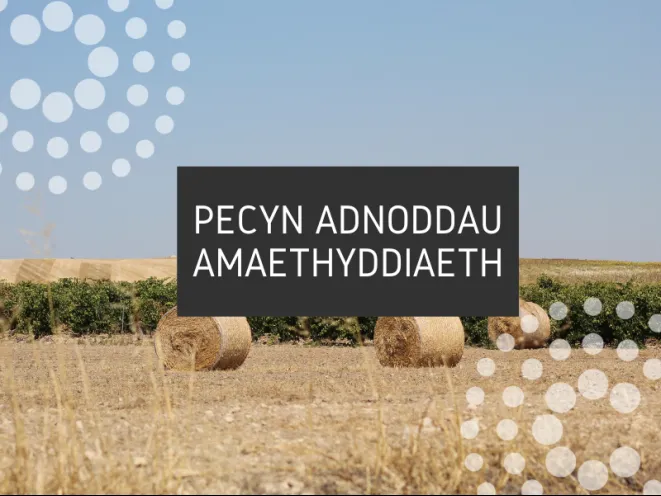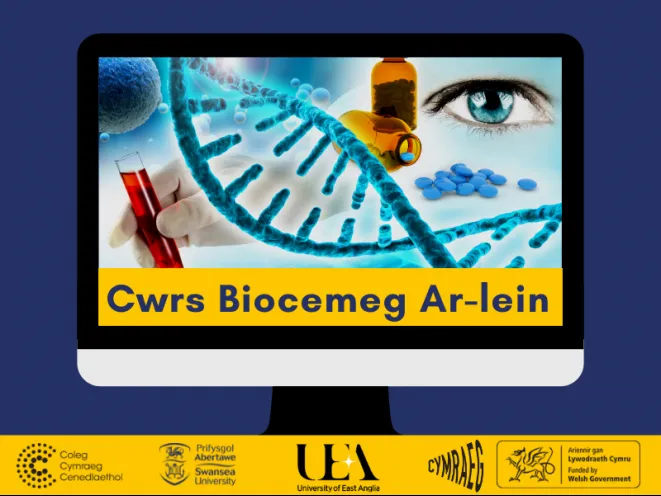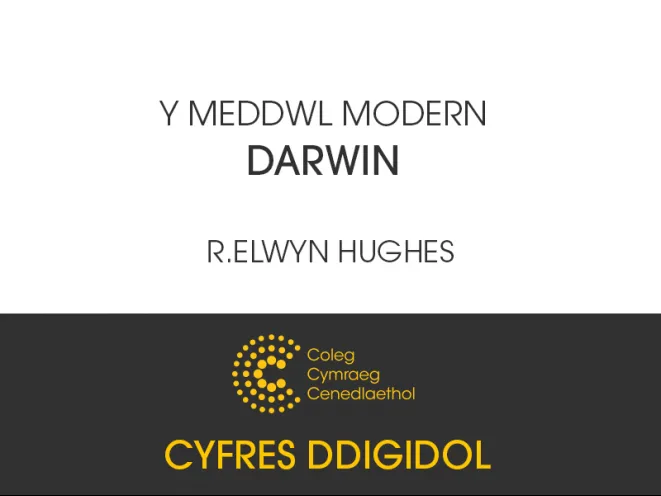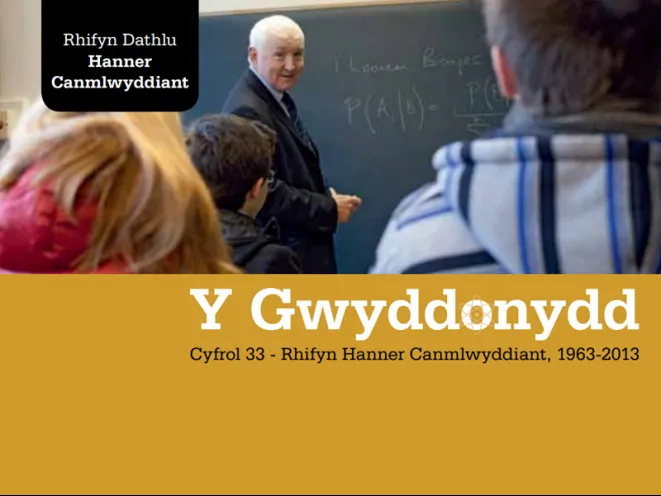This resource contains the following units: Health and Safety for the Landbased Industries Animal Physiology Crop Production Agricultural Power Units and Machinery Operations This resource was created by the Coleg Cymraeg Cenedlaethol based on Agricultural Learning Materials, a resource originally created by Sgiliaith (2002). The authors of the original resource were Lowri Evans, Ian Harries, Mary Richards and Rhys Williams, and it was edited by Penri James.
Agriculture Resource Pack
Carlam Cymru Revision Sessions
Recordings of revision sessions in different subject areas that were commissioned by e-sgol for GCSE, AS and A level students during 2021. There are GCSE revision sessions on: Mathematics Welsh Welsh as a second language Biology Physics Chemistry History Geography There are AS revision sessions on: Mathematics Welsh Biology Physics Chemistry History Geography There are A level revision sessions on: Mathematics Welsh Biology Chemistry History Geography Psychology
Welsh Biochemistry course
Online Biochemistry Course Studying AS/A Level Biology or Chemistry? Take part in the free, first Welsh-medium Online Biochemistry Course developed by Swansea University and the Coleg Cymraeg Cenedlaethol. Start your journey through the world of biochemistry with Elin Rhys and the Swansea University crew. This is a Welsh-medium Biochemistry online course aimed at students aged 16-18 studying AS/A level in Biology or Chemistry. The resource was developed by Swansea University's School of Medicine and the Coleg Cymraeg Cenedlaethol. It can be used as a resource to enhance the teaching of the WJEC Biology and Chemistry specification. Leading us through the course is Elin Rhys. It includes educational videos and cartoons, quizzes, information pages and interviews with leading scientists in their fields of research. Further information: Dr Alwena Morgan a.h.morgan@swansea.ac.uk
Wales' Chemistry Stars
Series of videos presenting the everyday work of chemists in laboratories in Wales and beyond. Original released as part of the activities of Eisteddfod Amgen 2021. Funded by the Royal Society of Chemistry. With thanks to Telesgop for producing and Eisteddfod Genedlaethol Cymru for sharing.
Science Conference 2021 (17/6/21)
The conference aims to showcase leading scientific research by Welsh language scientists and to nurture a Welsh language scientific community. The conference provides a platform to present and discuss various topics within the sciences. The Conference will be conducted in Welsh, and anyone with an interest in science is welcome to register, be they students, academics, members of the public or learners in schools and further education colleges.
Y Meddwl Modern: Darwin – R. Elwyn Hughes
Charles Darwin, ym marn llawer, oedd y biolegydd mwyaf erioed. Ef a fu'n bennaf cyfrifol am gyflwyno i'r byd un o'r syniadau pwysicaf yn holl hanes bioleg – Theori Esblygiad. Disgrifir yn yr e-lyfr hwn sut y daeth i lunio'i ddamcaniaeth enwog am darddiad pethau byw a sut yr ehangodd arni, yng nghwrs ei yrfa, i gofleidio holl weithgareddau dyn ei hun. Trafodir ei le yng ngwyddoniaeth ei gyfnod, a'r ymateb i'w syniadau. Ystyrir hefyd i ba raddau y bu i amgylchiadau personol a chymdeithasol ei gynorthwyo a'i lesteirio yn ei waith.
Y Gwyddonydd – cyfrol 33, 2013
Y Gwyddonydd, Cyfrol 33 – Rhifyn Hanner Canmlwyddiant, 1963-2013 Ymddangosodd Y Gwyddonydd, cyfnodolyn gwyddonol Cymraeg, am y tro cyntaf yn 1963, ac fe'i cyhoeddwyd yn gyson hyd at 1996. I ddathlu'r achlysur fe wnaeth y Coleg Cymraeg Cenedlaethol ariannu a chydlynu rhifyn dathlu arbennig, gan hefyd redeg cystadleuaeth gwyddonydd ifanc. Lansiwyd y rhifyn arbennig yn Eisteddfod Genedlaethol Sir Ddinbych, 2013.
The invasive plant Rhododendron ponticum L.: Its introduction and establishment in Wales, the threat to biodiv...
Rhododendron ponticum L. is an evergreen, woody shrub, belonging to the Ericaceae family. Native to parts of Spain, the Caucasus Mountains and the Black Sea coast, it was introduced to Britain in the eighteenth century. It has since developed into one of Britain’s most problematic invasive species, causing ecological and economic damage. This article discusses the history of R. ponticumin Wales, considering the environmental and social factors which have contributed towards its success here. The current situation in Wales is explained, including the damage it causes and the efforts undertaken to manage its spread. To conclude, the paper will evaluate how future environmental challenges will affect R. ponticum’s spread in Wales.
Corff Cymru (Cyfres 1) (2013)
Cyfres wyddonol yn edrych ar y corff o safbwynt y Cymry. Oherwydd rhesymau hawlfraint bydd angen cyfrif Coleg Cymraeg i wylio rhaglenni Archif S4C. Mae modd ymaelodi ar wefan y Coleg Cymraeg Cenedlaethol i gael cyfrif.
Are small peptides a nutrition source for plant and micro-organisms in the maritime Antarctic?
Nitrogen (N) is the most important element that controls plant growth. During the past twenty years, our understanding of which N species are important for plant growth has developed significantly but it is still thought that large nitrogenous molecules need to be broken down into their constituent amino acids to be available for plant and microbial growth. This paper builds on our understanding of this process and suggests that small peptides are equally important for microbial nutrition and that soil microbes outcompete plants for low molecular weight N compounds in maritime Antarctic soil.
The unique ecology of Ophelia bicornis, Savigny (Polychaeta)
The geographical distribution of Ophelia bicornis is restricted to the coasts of the Mediterranean Sea, the Black Sea and the western coast of Europe as far as Brittany and southern parts of Great Britain. Within this wide reach, the worm is restricted to very narrow areas (in the context of the rise and fall of the tide) of sand which are generally unsuitable for sustaining populations of animals and plants. Despite this, Ophelia is shown to succeed and flourish there, depending, to a large extent, on physical and physiological adaptation.
Ensuring future availability of ruminant products of the highest quality
Government statistics illustrate that by 2050 there will be a shortage of meat and milk due to globalpopulationgrowth and the increaseddemand from the Far East. Ensuring food security in terms of availability and nutritionalsafety is, therefore, important for our future existence. Central to achieving milk and meat security are ruminants. Ruminants have a four chambered stomach composed of the reticulum, rumen, abomasum and omasum with microbial fermentation of forage occurring in the rumen. Rumen microbial fermentation is largely responsible for animal production, ruminant product quality and much of greenhouse gas emissions. Indeed, when forage reaches the rumen, the rumen microbes degrade the plant cell wall and subsequently metabolise plant cell content, including plant amino acids and proteins which they convert into proteins that they can utilise. In order to ensure availability of milk and meat of the best possible quality (with the least greenhouse gas emissions) for the future, we must increase our understanding of the plant-microbe interactome using the principles of systems biology and 'omic' technology.











